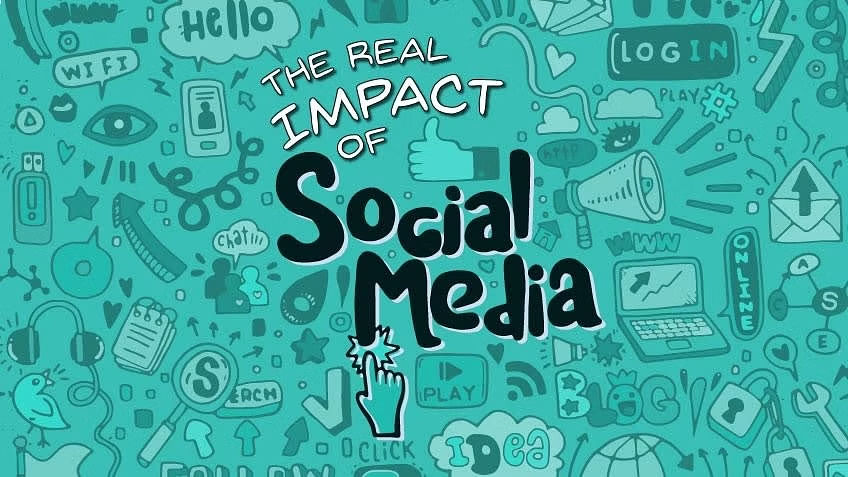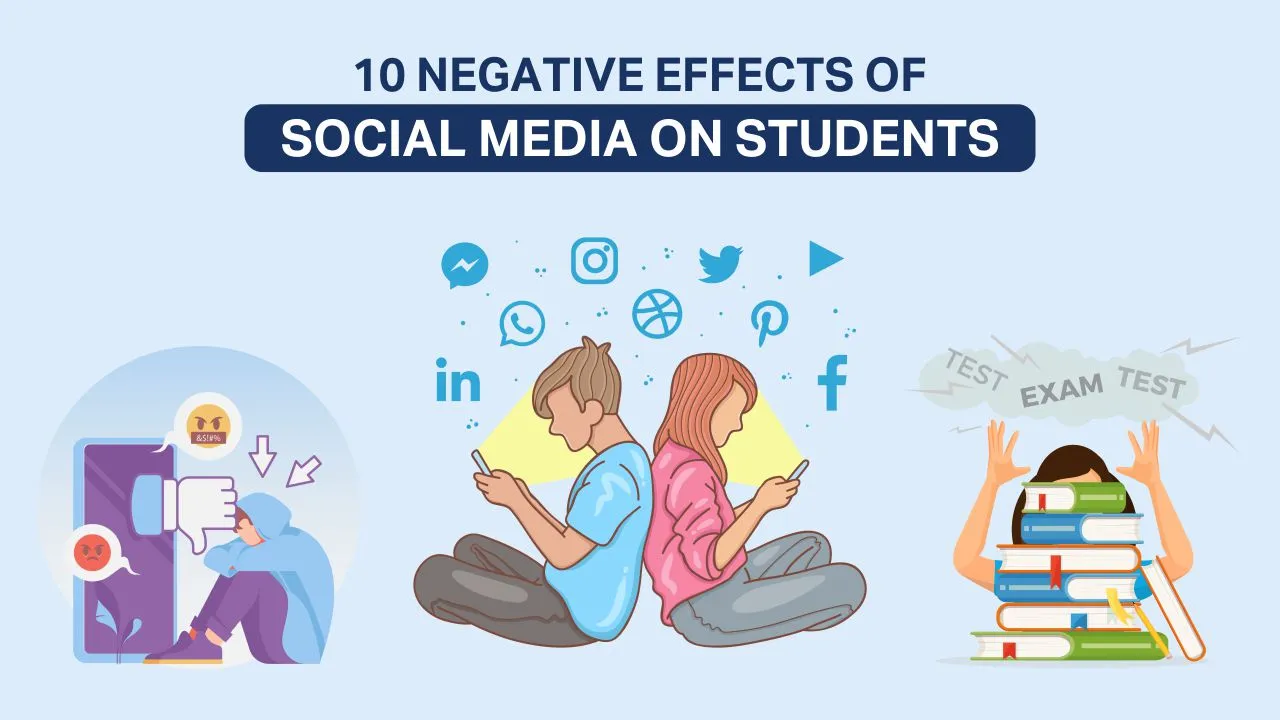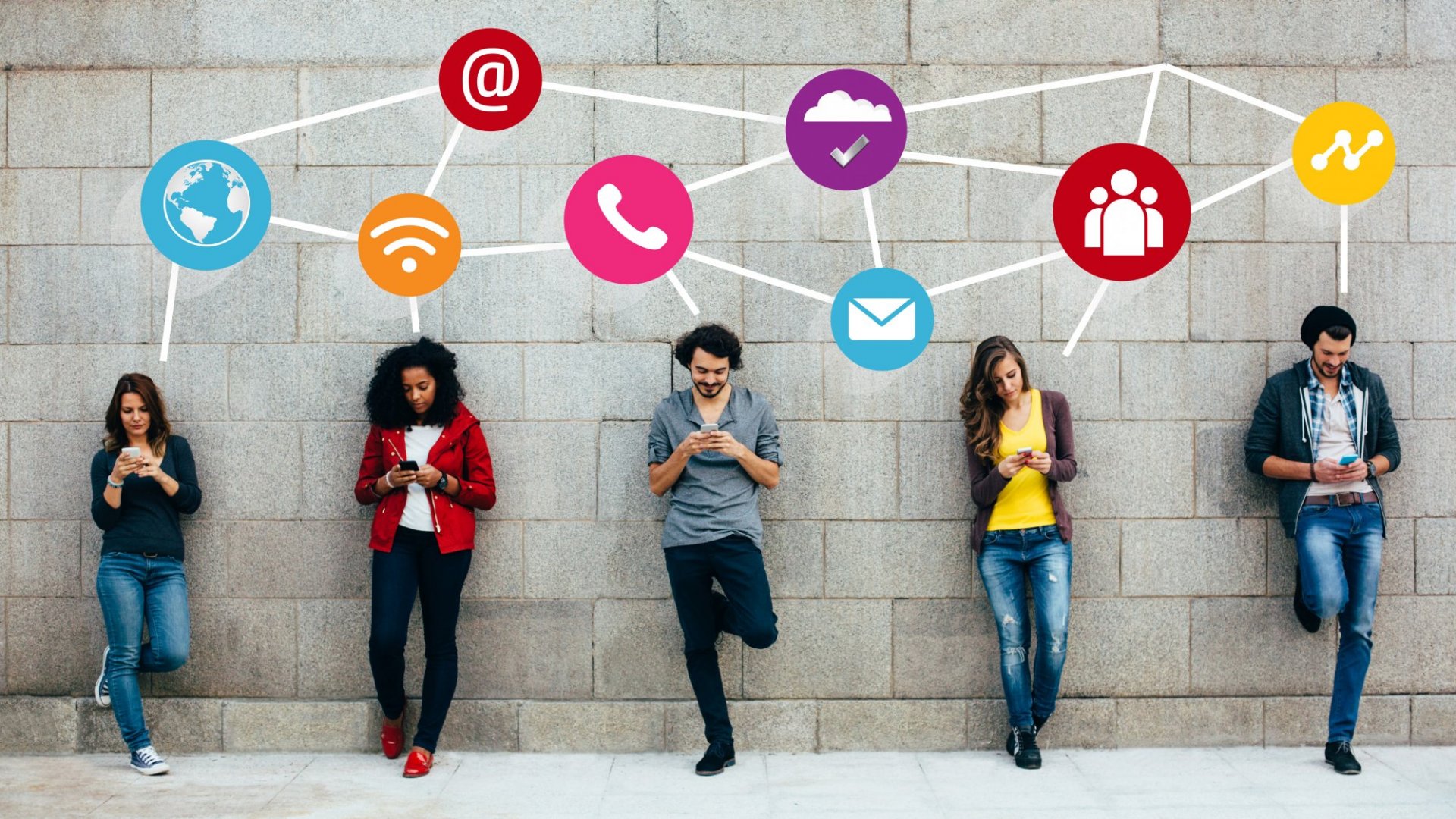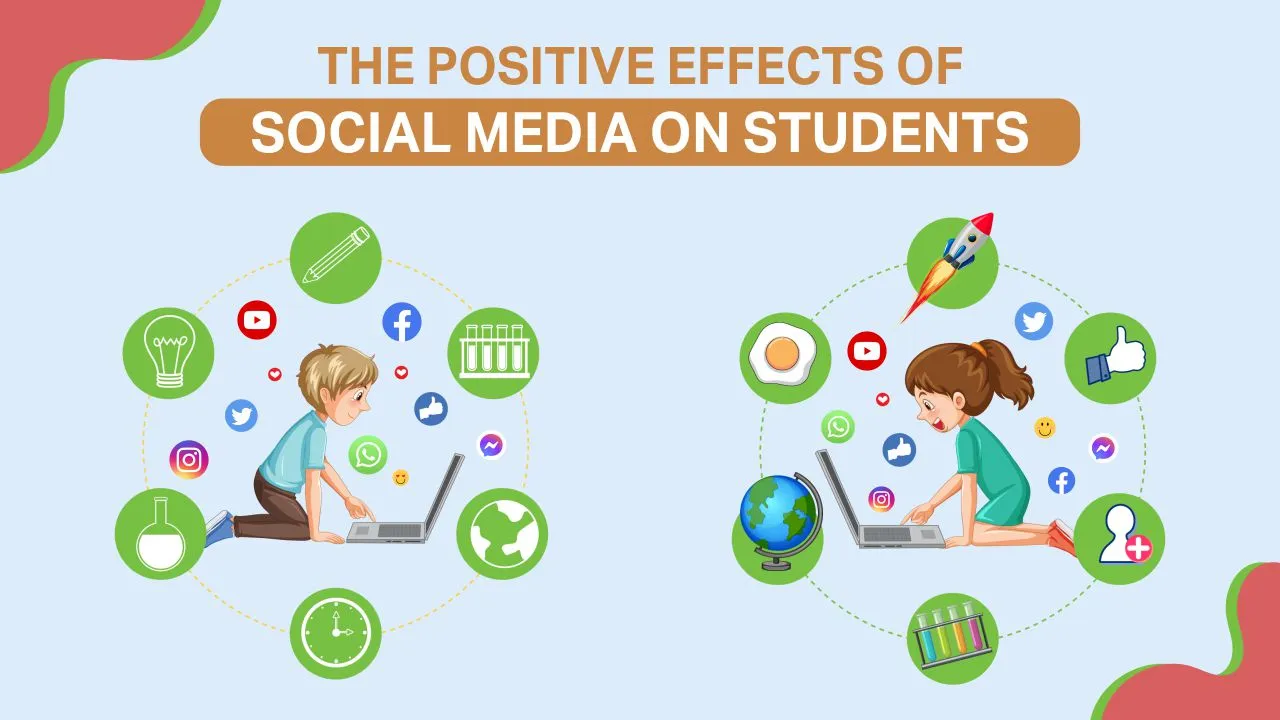Social media, viewed as a valuable tool with many great purposes for teens. The most impactful one among them is to develop social bonds and relationships. Thanks to sites such as Facebook, Instagram and Twitter, technology means that young people can have access to friends family and fellow ‘fans’ (or supporters of their cause) in any corner of the globe. Such a connection can go long way towards eliminating the isolation that some may feel, particularly those who are socially challenged in person.
In addition, social media gives an opportunity of self-presentation and creative representation. The best part is that young people involve in this sharing their thoughts, ideas and art with the wider audience. This literally is helping their self-confidence and boosting of morale because they are constantly being fueled by the feedback & validation from co-students. Also, social media can be your study resource.
Youth, some as young as ten years old from around the world can access educational content and teachings at any time online; meet new friends in a safe environment (we moderate all interaction); pursue hobbies they may never know even existed.
Social media can also be used for social and political activism. Communities can mobilise to be the change that they wish to see, young people are critical in ensuring this happens through organising protests and campaigns on issues which matter. Examples such as the gengtoto Arab Spring or Black Lives Matter show how voices have been magnified by social media to prompt societal and political change. For marginalized communities, having a stronger voice that is not otherwise heard through traditional media can make the difference.

Negative Impacts of Social Media on Youth
Although there are many social, economical and educational uses of social media… Social Media also tends to present a fair set it challenges when in comes yo our youth. Among the most worrying ones is its effect on mental health. The people in our lives and ourselves are not always sunny, flawless beach pictures nor should we be pressured into being such because there is no right or wrong way to just exist according to manufactured ideas of beauty.
In turn, this creates feelings of not being good enough, low self-esteem. Which can lead to depression and anxiety. The bottom line is research has demonstrated a robust relationship between time spent on social media and rates of mental health problems in young people.
Also, social media can gamble addicts and obsessive behaviour. The dopamine that is released when we see a new post, get likes on our own posts or receive notifications can be easily likened to an addictive reward loop. This can harm your academic performance, social relationships and well-being as a whole. This can lead young people to spend too much time wasting away on social media without taking into consideration other areas in their lives.
In addition to this, social media also poses serious risks towards the privacy and protection of young people. The sharing of personal information has even led to the exploitation of minors, identity theft and various cybercrimes. What’s more, it may live on in perpetuity and follow a young person into their tiny future as they get older; others could see damning spicy information about them that might affect later education and job prospects. The digital footprint is a way to trace back everything an individual has done online, and young people may not be well aware of how complex it might get.
Social Media Addiction and Its Consequences
The addicting nature of social media is the most alarming factor that concerns young people. The never-ending feed of dopamine burn-injoys happening has the brain in a feedback system that loops keeps us addicted. This can then lead to poor educational achievement, difficulties functioning socially and mental ill health in young people.
According to some studies, teenagers spend far too much time aimlessly scrolling through social media and it is having an adverse effect on their productivity. Such a situation could directly affect their academic successes, if they have trouble studying and meeting deadlines. Also, they are distressed with checking and refreshing their profiles of web-based social networking; accordingly this unrest disturbs the cycle rest which can assist them bear vastly improved on study results.
However, the worst ramifications of social media addiction may come not at school but from straining a young person’s friendships. The time and attention that is poured into social media can be at the cost of in real-life communications, resulting in silencing people out from having physical interactions with others.
This can be especially problematic for young people who may already suffer from social anxiety, or find it hard to make meaningful connections with others. Moreover, the consistent contrast with their friends’ cultivated social media lives can leave them to feel inferior and jealous, in turn harming their own social welfare.
Cyberbullying and Online Harassment on Social Media
The widespread nature of cyberbullying and online harassment is another particular worry about social media’s influence on the youth. Online platforms can provide a degree of anonymity and distance that some people abuse to engage in harmful, abusive behavior – often with very real and serious repercussions for the victims.
Cyberbullying — It can mean an onslaught of taverns, to derision and jokes huge stone hearts strung out with a vengeance. This can be incredibly detrimental for a young person’s confidence, mental health and in some cases their entire existence. Research suggests that cyberbullying leads to depression, anxiety and suicidality in victims of such attacks. As one might expect, the conduits of cyberbullying have serious repercussions through penetration by an unimaginable number and scale everywhere where students can find no refuge from his or her assailants.
In addition, social media surrounds young people with the opportunity for online bullying no matter how far removed from their own direct network. This can make people feel rather vulnerable and scared, as they may never be able to truely trust or feel safe in the digital world. This emotional erosion of an impeding doom, quite literally lurking around every corner takes its toll on our mental and physical well-being. The issue of cyberbullying and online harassment is important to address for the safety, health and well-being of young people growing up in a digital age.

The Role of Social Media in Shaping Societal Norms and Values
Beyond its impact on individual youth, social media has also played a significant role in shaping the broader societal norms and values. As a highly influential medium, social media has the power to amplify certain narratives, perspectives, and behaviors, which can in turn influence the attitudes and beliefs of the general population.
One of the ways in which social media has shaped societal norms is through the promotion of specific beauty standards and body image ideals. The proliferation of heavily edited and curated images on platforms like Instagram has contributed to the perpetuation of unrealistic beauty standards, which can have a detrimental impact on the self-esteem and body image of young people. This, in turn, can lead to the normalization of harmful behaviors, such as disordered eating and excessive cosmetic procedures, as individuals strive to conform to these idealized physical standards.
Moreover, social media has played a crucial role in the dissemination of information and the shaping of public discourse. The speed and reach of social media platforms can amplify certain narratives, often at the expense of nuance and critical thinking. This can lead to the spread of misinformation, conspiracy theories, and polarizing rhetoric, which can have far-reaching consequences for societal cohesion and the democratic process.
The ability of social media to quickly and widely disseminate content, regardless of its accuracy or veracity, can undermine the public’s trust in traditional media sources and erode the foundations of a well-informed citizenry.
At the same time, social media has also been a powerful tool for social and political activism, enabling marginalized communities to amplify their voices and drive meaningful change. The Black Lives Matter movement, for example, has leveraged social media to raise awareness, mobilize supporters, and challenge systemic racism. This demonstrates the potential for social media to be a force for positive societal transformation, but also highlights the need for responsible and ethical use of these platforms to ensure they serve the greater good.

The Impact of Social Media on Mental Health and Self-Esteem
One of the most significant and well-documented impacts of social media on youth is its effect on mental health and self-esteem. The constant exposure to carefully curated and edited images of their peers’ lives can lead young people to engage in unfavorable social comparisons, leading to feelings of inadequacy and low self-worth.
Studies have shown that excessive social media use is linked to an increased risk of depression, anxiety, and other mental health issues among young people. The pressure to present a perfect, Instagram-worthy life can be overwhelming, leading to a sense of failure and frustration when one’s own experiences and achievements fall short of the idealized standards portrayed online. This can be particularly problematic for adolescents, who are already grappling with the challenges of identity formation and self-discovery.
Furthermore, the fear of missing out (FOMO) and the desire for constant validation through likes and shares can contribute to a cycle of compulsive social media use, further exacerbating mental health concerns. Young people may find themselves constantly checking their phones, refreshing their feeds, and seeking approval from their online peers, often at the expense of their offline relationships and personal well-being. This can lead to a deterioration of their overall mental health and a negative impact on their self-esteem and self-worth.
Privacy Concerns and the Risks of Sharing Personal Information on Social Media
Another significant concern regarding the impact of social media on youth is the issue of privacy and the risks associated with sharing personal information online. The ease with which young people can share their thoughts, experiences, and personal details on social media platforms can have long-lasting consequences, both in the present and the future.
One of the primary risks is the potential for the exploitation of minors. The widespread sharing of sensitive information, such as the location of a young person’s school or home, can make them vulnerable to predators and other malicious actors. Additionally, the sharing of explicit or embarrassing content can have serious implications for a young person’s future, as this information can persist online and potentially impact their educational and employment opportunities.
Furthermore, the lack of understanding about the permanence and reach of digital information can lead young people to share content that they may later regret. The inability to fully comprehend the consequences of their online actions can expose them to risks such as identity theft, cyberbullying, and reputational damage. As social media becomes an increasingly integral part of daily life, the need for comprehensive digital literacy education and the development of responsible social media habits is paramount.
Strategies for Responsible Social Media Use Among Youth
Given the significant impact of social media on youth and society, it is crucial to develop strategies and guidelines for the responsible use of these platforms. This includes educating young people about the potential risks and benefits of social media, as well as empowering them to make informed decisions about their online behavior.
One key strategy is to promote digital literacy and critical thinking skills. By teaching young people how to identify misinformation, evaluate the credibility of online sources, and understand the implications of their digital footprint, we can equip them with the necessary tools to navigate the social media landscape more effectively. This can involve incorporating digital citizenship and media literacy curricula into school programs, as well as providing resources and guidance for parents and caregivers.
Additionally, it is important to encourage a balanced approach to social media use. Rather than completely banning or restricting access, it may be more effective to help young people develop healthy habits, such as setting time limits, prioritizing in-person interactions, and cultivating a diverse range of interests and activities beyond the digital realm. This can help mitigate the risks of social media addiction and promote overall well-being.
Furthermore, social media platforms themselves have a responsibility to implement robust privacy and safety measures to protect their younger users. This may include features such as age-appropriate content moderation, parental controls, and the ability to easily report and address instances of cyberbullying or harassment. By working collaboratively with social media companies, policymakers, and other stakeholders, we can create a safer and more empowering digital environment for young people.
Conclusion: The Future of Social Media in Society
As social media continues to evolve and become an increasingly integral part of our lives, it is clear that its impact on youth and society will continue to be a critical area of concern and focus. While the benefits of social media, such as fostering connections, enabling self-expression, and facilitating social and political activism, are undeniable, the risks and challenges it presents must also be addressed with diligence and foresight.
Moving forward, it will be essential to strike a balance between embracing the positive aspects of social media and mitigating its negative consequences. This will require a multifaceted approach, involving collaboration between policymakers, technology companies, educators, parents, and young people themselves.
By developing comprehensive strategies for digital literacy, promoting responsible social media habits, and ensuring the safety and well-being of young users, we can work towards a future where the transformative power of social media is harnessed for the greater good of individuals and society as a whole. If you like reading this article then please consider reading our article about Khitan Bayi.

